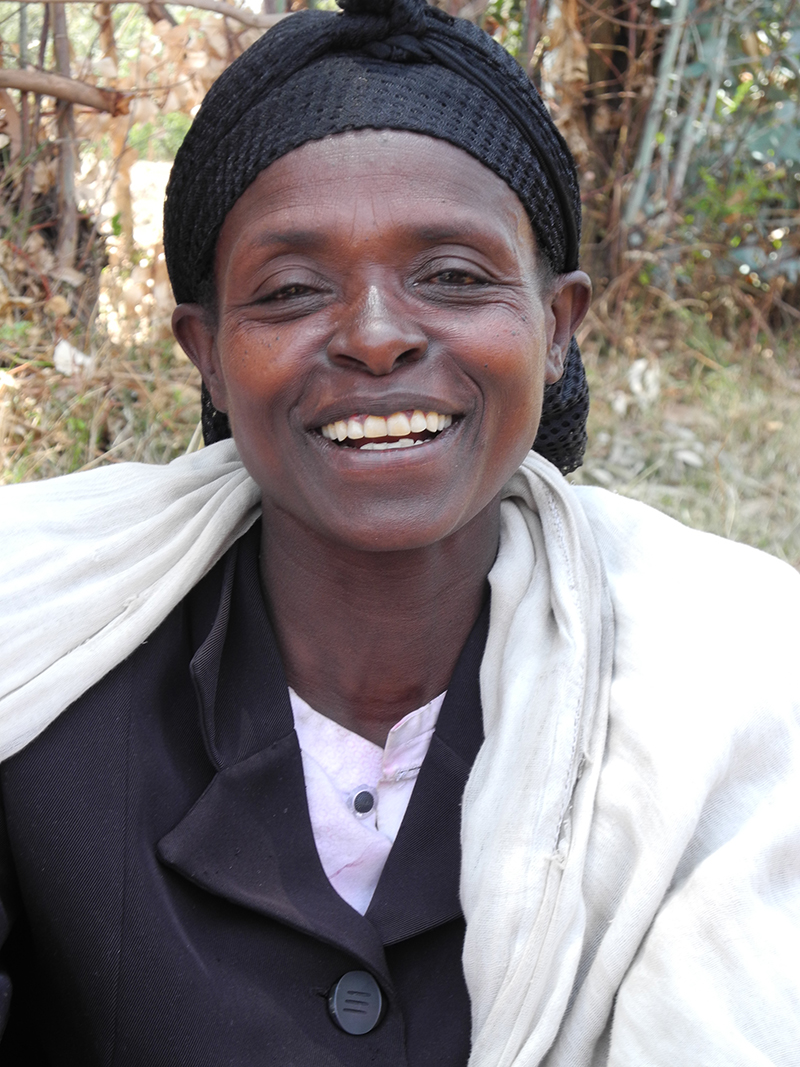International Women’s Day: Working together for equality in Ethiopia
Yadviga Clark is CAFOD’s Gender Coordinator. Today, on International Women’s Day, she shares the story of Dawi from Ethiopia whose community is coming together to tackle challenges faced by women and girls.
Today is a day to honour the achievements of women and girls across the world. Very often I think how privileged I am to be born and live in a society where as a woman I feel safe, protected and have an opportunity to develop my full potential. I can freely exercise my rights to education, family life and a career. At the same time, on this particular day my thoughts are with thousands of women and girls who are deprived of their childhood, have no voice, no rights, are hungry, exhausted from hard work and are physically and emotionally abused.
Our Lent Appeal this year tells the story of Proscovia, a 14 year old girl who nearly had to stop going to school because she had to spend so much of her day collecting water. Our partners in Uganda repaired her village borehole and now Proscovia is able to continue with her education.
Please support our Lent Appeal today
For CAFOD, International Women’s Day is a chance to celebrate the vision and bravery of women who are fighting for equality, their human rights and an end to poverty. The women we work with are trying to overcome the social, economic and political barriers which stop them reaching their full potential. In Ethiopia, our partner organisation HUNDEE is working with women, men and local leaders to empower women at home and in the community, with the aim of reducing harmful traditional practices and achieving greater gender equality in the community. The project supports women’s self-help groups and has set up community conversation forums to engage with the wider community.
Through the project, group members discuss the challenges faced by women and girls in their community and what needs to be done to tackle them. One of the group members, Dawi, told me: “We first identified the deep-rooted cultural and traditional practices that affect women and girls the most. Among them are violence against women, beating, rape, unequal access to family assets, male dominance, female genital mutilation, abduction, and polygamy. We learnt how these practices affect women and how they need to be improved.”
After Dawi received the training, she then trained another 12 women in her village and brought the community together for a pledge making ceremony. During the ceremony the community came together and made pledges or promises to put into practice what they learnt and say no to violence against women and to any harmful traditional practices. Community leaders also came along to the session and promised to follow up to make sure people kept their pledges.

Dawi told me how the training session helped her: “I didn’t know that women can have equal ownership over family assets. Our parents didn’t teach us that women can have an equal say. When I was growing up, all decisions over any family issues were in the hands of my father, and then they were in the hands of my husband. My husband rents out farmland without consulting me. I would never ask him why he would rent out the farmland or where he was spending the money. Women are not allowed to ask their husbands these sorts of questions.
Read more about our gender work
“My husband and I took part in the awareness-raising activities during the project, and now a lot has changed in my family. We are working together without arguments. Before this project, both of us didn’t have awareness about the importance of equal decision making in our family. Now, if we have an issue we put it on the table for discussion and share the decision. My husband has never fetched water or collected firewood before this project as these were considered to be the tasks of women. Now he supports me in fetching water and collecting firewood.”
The self-help group also helps Dawi to earn an income. She received some money towards seeds to start sheep fattening and her own small grain trade, which has helped her to start providing food for her family and make significant contributions towards the cost of her children’s education. Since joining the self-help group, Dawi has learnt new business skills: “Now I rely more on the new business than only on farming which has changed my husband’s attitude towards me now. I think he has more respect for me.”
“Today, I have started enjoying equal privileges as my husband in my home and also have the opportunity to make decisions equally with him. Family issues are decided together based on mutual understanding and agreement. This shared decision making has improved my family relationship. This has helped us to use our resources more efficiently.”
Each project is a step closer to a safer world. Jesus treated all women with the deepest respect and equal to men. As the apostle Paul wrote: “There is neither Jew nor Greek, slave nor free, male nor female, for you are all one in Christ Jesus” (Galatians 3:26-28). Thank you for helping us to empower women, like Dawi, and supporting them to find their voice in their communities. Without the generosity of CAFOD’s supporters, such projects would not be possible.
Please donate to our Lent Appeal today
Women are needed in the world just as much as men and it is inspiring to see the work that CAFOD does in supporting equality. It is sad that this even happens in the world but no matter what I for one will always support campaigns like this. Big hearts and kind, open minds are what allows this to happen.
Reblogged this on CAFOD Salford Blog and commented:
Yesterday’s blog piece from CAFOD’s main blog concerning CAFOD’s partners in Ethiopia who are empowering women to change their lives through better equality.